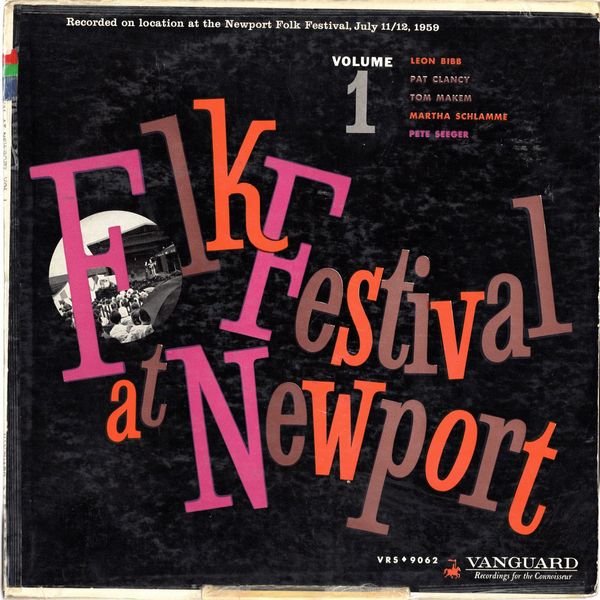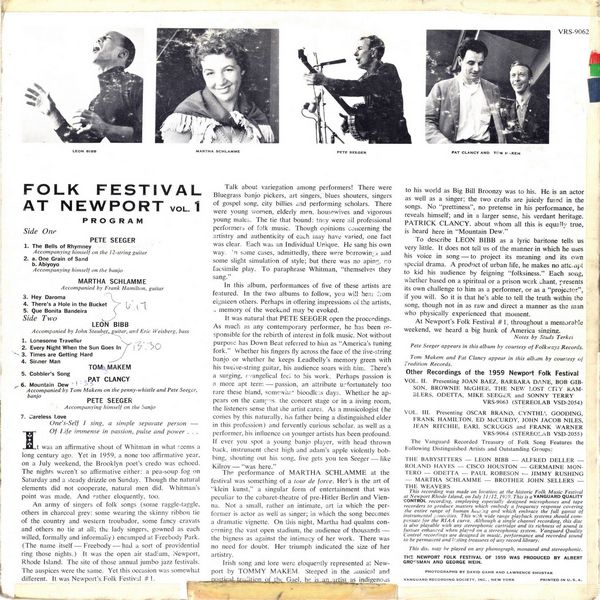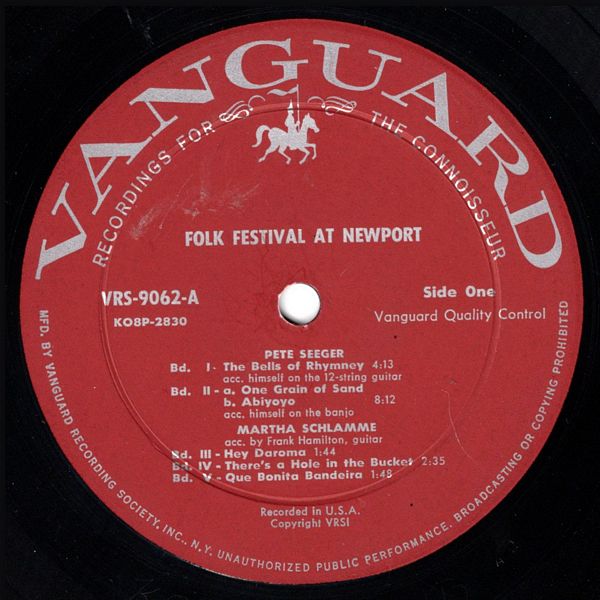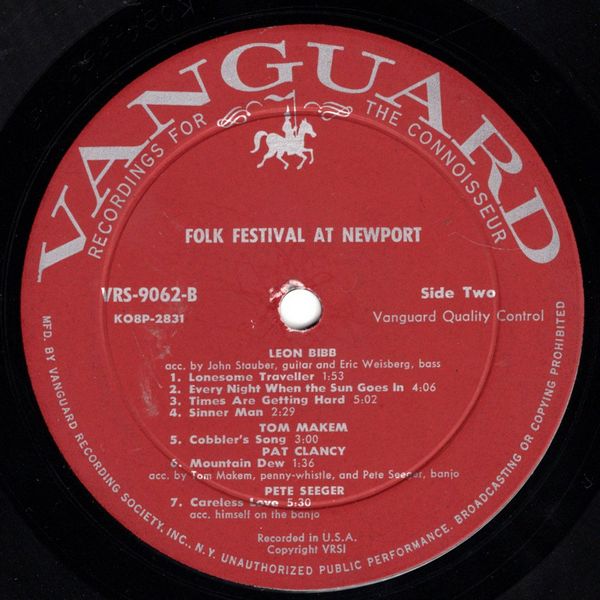
 |


 |
Sleeve Notes
One's-Self I sing, a simple separate person — Of Life immense in passion, pulse and power …
It was an affirmative shout of Whitman in what seems a long century ago. Yet in 1959, a none too affirmative year, on a July weekend, the Brooklyn poet's credo was echoed. The nights weren't so affirmative either: a pea-soup fog on Saturday and a steady drizzle on Sunday. Though the natural elements did not cooperate, natural men did. Whitman's point was made. And rather eloquently, too.
An army of singers of folk songs (some raggle-taggle, others in charcoal grey; some wearing the skinny ribbon tie of the country and western troubador, some fancy cravats and others no tie at all; the lady singers, gowned as each willed, formally and informally) encamped at Freebody Park. (The name itself — Freebody — had a sort of providential ring those nights.) It was the open air stadium, Newport, Rhode Island. The site of those annual jumbo jazz festivals. The auspices were the same. Yet this occasion was somewhat different. It was Newport's Folk Festival # 1.
Talk about variegation among performers! There were Bluegrass banjo pickers, art singers, blues shouters, singers of gospel song, city billies and performing scholars. There were young women, elderly men, housewives and vigorous young males. The tie that bound: they were all professional performers of folk music. Though opinions concerning the artistry and authenticity of each may have varied, one fact was clear. Each was an Individual Unique. He sang his own way. In some cases, admittedly, there were borrowings and some slight simulation of style; but there was no aping, no facsimile play. To paraphrase Whitman, “themselves they sang.”
In this album, performances of five of these artists are featured. In the two albums to follow, you will hear from eighteen others. Perhaps in offering impressions of the artists, a memory of the weekend may be evoked.
It was natural that PETE SEEGER open the proceedings. As much as any contemporary performer, he has been responsible for the rebirth of interest in folk music. Not without purpose has Down Beat referred to him as “America's tuning fork.” Whether his fingers fly across the face of the five-string banjo or whether he keeps Leadbelly's memory green with his twelve-string guitar, his audience soars with him. There's a surging, evangelical feel to his work. Perhaps passion is a more apt term — passion, an attribute unfortunately too rare these bland, somewhat bloodless days. Whether he appears on the campus, the concert stage or in a living room, the listeners sense that the artist cares. As a musicologist (he comes by this naturally, his father being a distinguished elder in this profession) and fervently curious scholar, as well as a performer, his influence on younger artists has been profound. If ever you spot a young banjo player, with head thrown back, instrument chest high and adam's apple violently bobbing, shouting out his song, five gets you ten Seeger — like Kilroy — “was here.”
The performance of MARTHA SCHLAMME at the festival was something of a tour de force. Her;s is the art of “klein kunst,” a singular form of entertainment that was peculiar to the cabaret-theatre of pre-Hitler Berlin and Vienna. Not a small, rather an intimate, art in which the performer is actor as well as singer; in which the song becomes a dramatic vignette. On this night, Martha had qualms concerning the vast open stadium, the audience of thousands — the bigness as against the intimacy of her work. There was no need for doubt. Her triumph indicated the size of her artistry.
Irish song and lore were eloquently represented at Newport by TOMMY MAKEM. Steeped in the musical and poetical tradition of the Gael, he is an artist as indigenous to his world as Big Bill Broonzy was to his. He is an actor as well as a singer; the two crafts are juicily fused in the songs. No "prettiness", no pretense in his performance, he reveals himself; and in a larger sense, his verdant heritage. PATRICK CLANCY, about whom all this is equally true, is heard here in "Mountain Dew."
To describe LEON BIBB as a lyric baritone tells us very little. It does not tell us of the manner in which he uses his voice in song — to project its meaning and its own special drama. A product of urban life, he makes no attempt to kid his audience by feigning "folksiness." Each song, whether based on a spiritual or a prison work chant, presents its own challenge to him as a performer, or as a "projector", if you will. So it is that he's able to tell the truth within the song, though not in as raw and direct a manner as the man who physically experienced that moment.
At Newport's Folk Festival #1, throughout a memorable weekend, we heard a big hunk of America singing.
Notes by Studs Terkel